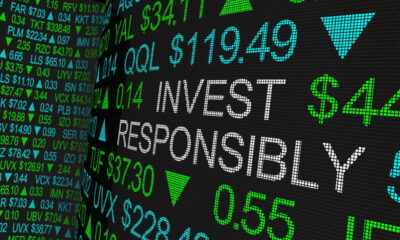Features
The World of Ethical Investment
Penny Shepherd gives the case for ethical investment and participants from each segment of the community provide their reactions.
 Penny Shepherd, Sustainable Investment & Finance Association (UKSIF)
Penny Shepherd, Sustainable Investment & Finance Association (UKSIF)
Many of us are increasingly concerned with the wider impact of our purchasing choices. Household spending on ethical goods and services has grown by 18 percent over the last two years, despite the economic downturn, while the financial crisis has prompted a new level of concern about whether investments and savings are ‘socially useful’. As a Financial Times article last year said, “One positive result of the credit crisis has been a renewed interest in the purpose of investment; owning assets that will add value to society rather than financial engineering.”
Penny Shepherd gives the case for ethical investment and participants from each segment of the community provide their reactions.
 Penny Shepherd, Sustainable Investment & Finance Association (UKSIF)
Penny Shepherd, Sustainable Investment & Finance Association (UKSIF)
Many of us are increasingly concerned with the wider impact of our purchasing choices. Household spending on ethical goods and services has grown by 18 percent over the last two years, despite the economic downturn, while the financial crisis has prompted a new level of concern about whether investments and savings are ‘socially useful’. As a Financial Times article last year said, “One positive result of the credit crisis has been a renewed interest in the purpose of investment; owning assets that will add value to society rather than financial engineering.”
This growing awareness and concern is fuelling a movement towards more sustainable and responsible financial services. Much like the decision to buy ethical or fair-trade goods, you can now make corresponding choices when it comes to your savings and investments.
Those who would like their money to make a positive contribution to the world are not alone. Research for National Ethical Investment Week in 2010 found that more than half (54 percent) of all GB adults with investments want to make both money and a difference. Only a small percentage of people are willing to make a trade-off, though, to accept a lower financial return. Many are also more concerned about understanding the risks involved in how their money is invested – is it invested in ways that have high social and environmental risks that are not being recognised, in the same way that the risks of some business practices before the financial crisis were not recognised? The BP Gulf of Mexico crisis is a high-profile example that illustrates the validity of this concern.
Across Europe the sustainable and responsible investment market now totals €5 trillion, which includes €1.2 trillion invested in core strategies like thematic investing using sustainability themes (for example, water, sustainable forestry). These figures represent growth of just under 90 percent in two years. In the US the most recent estimate is that one in nine dollars invested in financial markets specifically takes sustainable and responsible investment issues into account.
This market growth has led to a greater range of available solutions and products. There are sustainable and responsible options when it comes to investments, banking, ISAs, pensions, insurance and even mortgages. For example, there are now more than 90 green and ethical funds available in the UK. As well as having different financial characteristics, these funds address a range of issues – from opportunities to invest in businesses tackling today’s challenges, such as climate change and resource scarcity, to options for those wishing to avoid investing in certain industries or products.
As the UK and, indeed, the world face an increasing array of social and environmental challenges, sustainable and responsible investment and money management represent an opportunity to benefit financially from new opportunities in this area, while at the same time contributing towards finding solutions that will improve all of our lives, now and in the future.
Penny Shepherd MBE is Chief Executive of UKSIF, a membership network for sustainable and responsible financial services. www.uksif.org
 Clare Brook, fund manager
Clare Brook, fund manager
It is hugely encouraging that over half of all British adults with investments want not only to make money but also to ‘make a difference’. The question is how they should go about it. One route is to invest in mainstream shares, taking care to ensure the fund manager is actively engaging with company management, encouraging them to be more responsible towards the environment, their employees and wider society.
Another way is to ensure the companies invested in are providing solutions to society’s most serious problems, rather than simply being part of the problem. The top 10 holdings of most ethical funds are a combination of banks, telecomm companies and supermarkets. Some also hold mining and oil companies, usually justified by claiming they are the ‘best in breed’ of these sectors. By investing instead in the growing ‘thematic’ sector, people can own investments in companies in the alternative energy, energy efficiency, recycling and water sectors, for example. Not only are these companies ‘making a difference’ but, in many cases, they offer exciting growth opportunities. No wonder this sector totals, as Penny says, €1.2 trillion and is growing rapidly. People are realising it’s a viable alternative to traditional ethical investing.
Clare Brook is fund manager of the IM WHEB Sustainability Fund. www.whebam.com
 Huw Davies, banker
Huw Davies, banker
Penny’s quite right when she mentions the choices now available for being green or ethical with your finances.
While fair trade helps improve lives for producers in the developing world, and organic has environmental and possible health benefits, finance has a far wider impact – because it’s interconnected with all areas of the economy and life. Choosing ethical finance is one of the more powerful things you as a consumer can do.
In light of recent events, people are considering a change to their banking arrangements. Indeed, recent research conducted by Opinium shows that many people can’t find a single reason to recommend their current bank. And for 37 percent of those who won’t recommend, it comes down to their bank’s financial excesses in terms of hefty bonuses and excessive profits.
Sustainable and ethical banking aims to show customers that a bank can have a positive impact on society and the environment. Such financial institutions want people to take an interest, to become involved and to look more closely at how their savings are invested.
Triodos customers, for example, can rest assured that their money is actively doing good and not just avoiding harm. Triodos publishes details of every business it lends to.
Huw Davies is head of personal banking at Triodos Bank. www.triodos.com

Julian Parrott, financial adviser
Fundamentally, I agree with Penny. Interest in ethical and sustainable investment has grown significantly over the last 5 to 10 years. This reflects the growing awareness of environmental issues amongst the public and what might be called the ‘fair-trade effect’, where a previously niche product has emerged into the wider market and become more readily available. While an increase in investable environmental solutions has boosted the sustainability sectors, the recent banking crisis has also served to remind the public what happens to their money. It’s led to a growing interest in how savings are invested.
In the wider adviser community we have seen the ‘ethical question’ become increasingly important. Where advisers would once have shied away from asking clients about their concerns, these days, with the help of organisations like UKSIF and the EIA, which provide help and support with sector knowledge and engaging clients, they are finding such questions more and more relevant. The wide choice of available investment opportunities now means there are genuine financial planning options for clients at all stages of life, regardless of their financial objectives and whether they want to just dip their toe in the green water or dive right in.
Julian Parrott is a partner with Ethical Futures. www.ethicalfutures.co.uk
 Matt Holt, investor
Matt Holt, investor
I don’t really think of any investment I make in terms of its being ‘most socially useful’ but I do look for the ‘least damaging’; investments that don’t seem actively to hurt anyone. I’m sure this will seem unduly cynical to some and painfully naive to others. Once I’ve ruled out any options where I can draw a clear and direct line to business areas I’m uncomfortable with, I’m pretty much left with funds that list themselves as ethical. On some level I hope that if enough people take this view it might have a wider effect on the investment market but, really, this is just about what I feel comfortable with as an individual.
The idea was to invest some money to put something aside for my kids (nine-month-old twins) so it would be a tad counter-productive if said funds are contributing towards buggering the world up. If I’m going to do that, I might as well spend the money now on a nice holiday for us all while there are still holidays to be had.
So I’ve opted for a slightly lower return on my money and a conscience that will let me sleep at night. Having said that given that the twins won’t let me sleep at night maybe they deserve to have my money invested in guns and pollution and stuff. (Joke.)
Matt Holt is a private investor.


 Environment12 months ago
Environment12 months agoAre Polymer Banknotes: an Eco-Friendly Trend or a Groundswell?

 Features11 months ago
Features11 months agoEco-Friendly Cryptocurrencies: Sustainable Investment Choices

 Features12 months ago
Features12 months agoEco-Friendly Crypto Traders Must Find the Right Exchange

 Energy11 months ago
Energy11 months agoThe Growing Role of Solar Panels in Ireland’s Energy Future

































